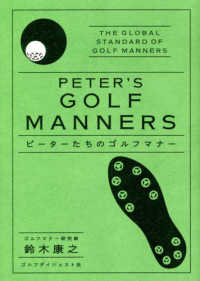- ホーム
- > 洋書
- > 英文書
- > Literary Criticism
Full Description
Although understudied in the West, Iurii Trifonov was a canonical Soviet author whose lifetime spanned nearly the whole of the USSR's history and who embodied many of its contradictions. The son of a Bolshevik murdered on Stalin's orders, he wrote his first novel in praise of the dictator's policies. A lifelong Muscovite, he often set his prose in the Central Asian peripheries of the USSR's empire. A subtle critic of the communist regime, he nonetheless benefited from privileges doled out by a censorious state.
Scholars have both neglected Trifonov in recent years and focused their limited attention on the author's most famous works, produced in the 1960s through 1980s. Yet almost half of his output was written before then. In Empire of Objects, Benjamin Sutcliffe takes care to consider the author's entire oeuvre. Trifonov's work reflects the paradoxes of a culture that could neither honestly confront the past nor create a viable future, one that alternated between trying to address and attempting to obscure the trauma of Stalinism. He became increasingly incensed by what he perceived as the erosion of sincerity in public and private life, by the impact of technology, and by the state's tacit support of greed and materialism. Trifonov's work, though fictional, offers a compelling window into Soviet culture.
Contents
Acknowledgments
Introduction: The Unknown Trifonov
1 A Radiant Future of Things: Trifonov's Stalin-Era Prose
2 Enthusiasm and Ambivalence: Trifonov and the Thaw
3 Empire of Objects: Sincerity and Consumption in the 1970s
4 Utopia Lost: Sincerity and the Past in Trifonov's Final Works
Conclusion: Echoes of Trifonov and Soviet Culture
Notes
Bibliography
Index






